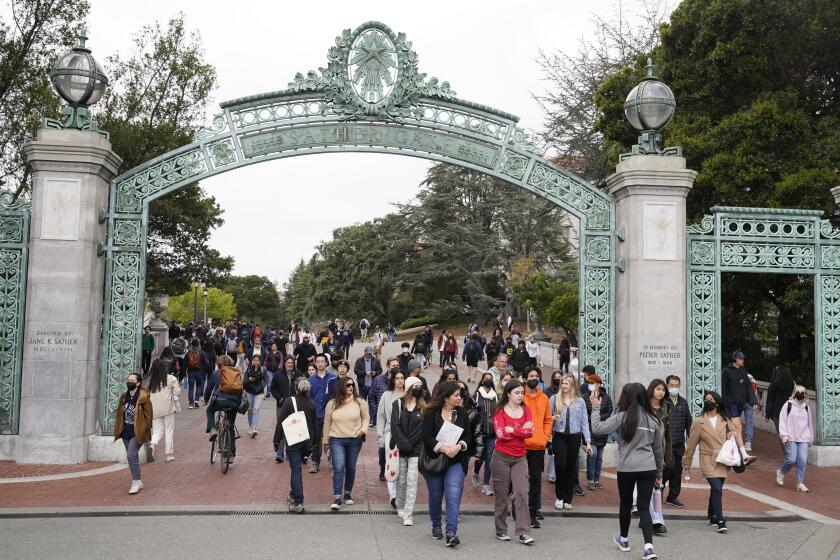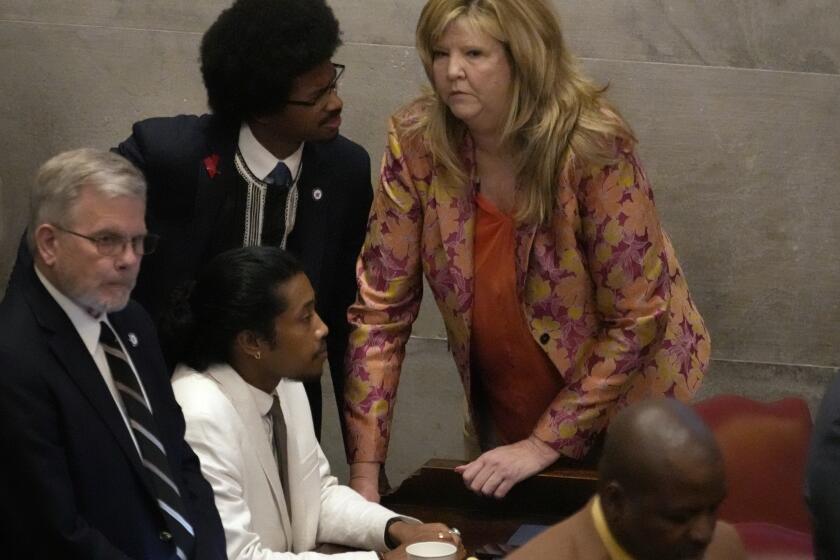Opinion: College campus hecklers, your disruptions don’t count as free speech

America is experiencing two disturbing simultaneous trends: the rise of mob censorship to shut down speaking events on college campuses, and an attempt to justify it as merely the exercise of “more speech.”
At SUNY Albany last week, protesters stormed an event, formed an improvised conga line and prevented a lecture — ironically, titled “Free Speech on Campus” — from beginning.
In a now notorious incident at Stanford Law School last month, protesters shouted down a federal appellate judge’s speech.
And in November, hecklers drowned out conservative commentator Ann Coulter at Cornell, playing loud music, chanting, shouting at her and repeatedly preventing her from speaking. “We don’t want you here, your words are violence,” screamed one heckler.
When one student group sought to exclude certain speakers, an internal debate swirled into a huge online controversy.
I have defended free speech on college campuses for over a decade. We’ve seen waves of shout-downs before. But few defended the disruptions. In fact, they were usually met with near-universal condemnation.
Not so anymore. Some now argue that drowning out and shutting down speakers is an exercise of “more speech,” not an attempt to carry out a “heckler’s veto” on the speaker. Depressingly, 62% of college students say that shouting down a speaker is acceptable to some degree.
“It’s called protest,” one Stanford student remarked to Judge Kyle Duncan while the judge objected to being shouted down. “It’s under the 1st Amendment. I thought you knew about the 1st Amendment.” Later, after the Stanford administration condemned the incident, a group of protesters papered Stanford Law Dean Jenny Martinez’s classroom with fliers reading, “We have free speech rights too,” and, “‘Counter-speech’ is free speech.”
Apparently, America’s future lawyers and future judges fundamentally misunderstand free speech rights. Shouting down speakers is just like any other form of censorship: It’s the few deciding for the many what they can hear. Protesters have every right to engage in peaceful, nondisruptive protest. But they do not have the right to take over someone else’s event and make it their own.
This is a basic point, and we understand it in almost every other context. Nobody argues that you have a free speech right to stand up during a Broadway musical and sing along with the actors or to scream at a public library book reading.
Just because the public is invited to attend an event — and sometimes to speak during a Q&A period — does not make it the public’s event to disrupt or transform as it pleases. Your distaste for a speaker doesn’t grant you a right to prevent a willing audience from listening to that speaker.
The expulsion of two Tennessee lawmakers for their gun control protests is an ominous assault on speech and democracy
There must be places in a free and pluralistic society where groups can freely associate and share ideas without first seeking approval from a crowd of hecklers. Colleges are such spaces. It’s the very reason they exist.
One increasingly common semantic game is to argue that “heckler’s veto” is a legal term and that it applies only when the government steps in to shut down speech in anticipation of a disruptive response. But as a practical matter, the government — or on college campuses, those in the administration — can end up supporting a heckler’s veto through its action or inaction. Besides, “heckler’s veto” has long had a nonlegal, colloquial definition that tracks the plain meaning of the words: hecklers vetoing speech.
In either case, both the hecklers and those in authority who enable them will regret normalizing this sort of response to speech.
In December 1860, Frederick Douglass and a group of abolitionists assembled at a public meeting hall in Boston to discuss how to abolish slavery. No sooner had the meeting begun than it was overtaken by a pro-slavery mob. The police did nothing to prevent the heckling and disruption, and the meeting was eventually shut down. A few days later, Douglass gave an impassioned defense of free speech: “To suppress free speech is a double wrong. It violates the rights of the hearer as well as those of the speaker.”
The “heckling-is-free-speech” crowd may argue that the pro-slavery mob’s action was wrong because of its message, whereas those engaged in today’s disruptions are morally right. But we can’t hinge the validity of a heckler’s veto on whether the hecklers feel justified in their actions. They always do. That’s why justifications for censorship shouldn’t be allowed to outweigh principles of free speech.
While students may succeed today in shouting down speakers they oppose, they should realize that those same tactics could be used tomorrow against speakers they support.
Nico Perrino is executive vice president of the Foundation for Individual Rights and Expression and host of “So to Speak: The Free Speech Podcast.”
More to Read
A cure for the common opinion
Get thought-provoking perspectives with our weekly newsletter.
You may occasionally receive promotional content from the Los Angeles Times.












